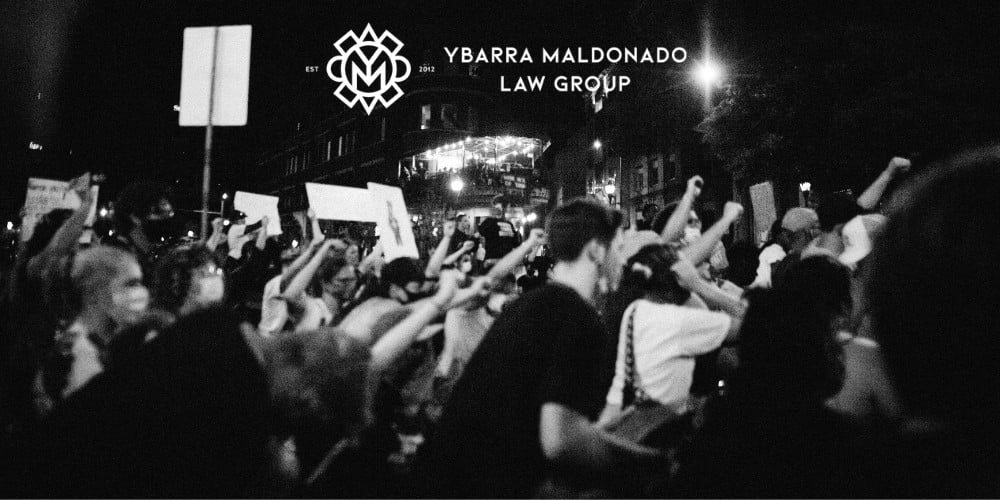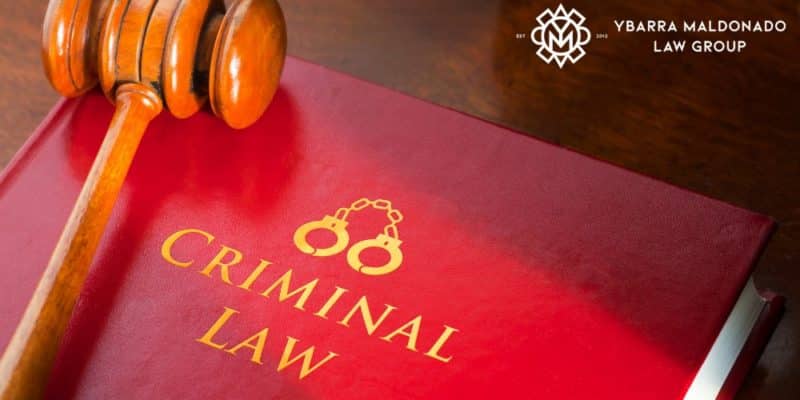ARS DISORDERLY CONDUCT LAWYER IN PHOENIX
PRACTICE AREAS
DON’T HESITATE TO REACH OUT TO US!
Our Law Firm is committed to becoming the best Law Firm for Latino, migrant, and Spanish speaking communities in Arizona.
ARS 13-2904 Disorderly Conduct Defense

Certain laws and regulations exist to keep the peace in our communities. However, the language of many of these laws is intentionally vague. Vague language and laws often allow officers to charge people with certain crimes, such as disorderly conduct, when the accused wasn’t engaged in any disruptive behavior. If you were charged under the ARS disorderly conduct law in Arizona, you need an experienced Phoenix criminal defense lawyer on your side.
At Ybarra Maldonado Law Group, we take great pride in defending those who are wrongfully accused of serious crimes. Having any form of criminal record can greatly impact your life, even if it’s for a minor misdemeanor. If you’ve been charged with disorderly conduct in Arizona, the criminal defense attorneys at Ybarra Maldonado Law Group are here for you. To schedule your case evaluation with us, please call our office at 602-910-4040 today.
What Is Disorderly Conduct in Arizona?
According to the Arizona Revised Statutes, Title 13-2904, a person commits disorderly conduct if they do any of the following with the intent to disturb the peace.
- Using any abusive or offensive language or gestures toward someone in a way that might provoke immediate physical retaliation by that person.
- Making unreasonable noise.
- Engaging in fighting, disruptive behavior, or violent acts.
- Making a commotion that lasts a long time with the intent to disrupt a business, lawful meeting, or other gathering.
- Refusing to obey orders to disperse in order to maintain public safety in dangerous proximity to certain hazards.
- Recklessly handling, displaying, or discharging a dangerous instrument or deadly weapon.
As you can see, Arizona law fails to define many terms in ARS 13-2904. Examples of some of these terms include abusive or offensive language, disruptive behavior, unreasonable noise, deadly weapon or dangerous instrument, and several others. Because of this vague language, disorderly conduct charges could arise from many actions that are not explicitly prohibited by ARS 13-2904.
Disorderly Conduct With a Weapon Arizona
If someone brandishes a deadly weapon or dangerous instrument, this could result in a felony disorderly conduct conviction. This charge carries a minimum prison sentence of 1.5 years with a maximum incarceration of 3 years. In a misdemeanor charge, the penalties may not even involve jail time. This is a perfect example of the difference in severity between a misdemeanor and felony charge.
If someone is convicted of misdemeanor disorderly conduct, they could face up to six months in jail. They may also face probation and a maximum fine of $2,500.
Disturbing the Peace in Arizona
Remember that disorderly conduct does not require brandishing a weapon or even using offensive language or gestures. One can also be charged with disorderly conduct for disturbing the quiet of a neighborhood.
For example, imagine that someone sits in their driveway and works on their car while listening to loud music. During the day, this might not be an issue. But if they were to do that in the middle of the night, they could face disorderly conduct charges.
What Happens if You Are Charged with Disorderly Conduct?

Unfortunately, misdemeanor disorderly conduct charges are among the most common misdemeanor charges in Arizona. This is largely due to the broad language of the applicable law. In many cases, police officers will charge someone with disorderly conduct when they can’t think of another crime to charge them with.
If this happens, we recommend speaking with a criminal defense lawyer as soon as possible. Without proper representation, you may find yourself fighting against a serious misdemeanor or even a felony conviction. Fight for your legal rights with help from an experienced defense attorney who is well-versed in Arizona law.
Is Disorderly Conduct a Felony or Misdemeanor?
This depends on the actions that led to the disorderly conduct charge. You can only be charged with felony disorderly conduct for recklessly handling or discharging a deadly weapon or dangerous instrument. Disorderly conduct charges for other actions are considered misdemeanors.
What Are the Penalties for Disorderly Conduct?
Disorderly conduct cases can have serious consequences, regardless of whether you are charged with a misdemeanor or a felony. If convicted, you could see the following penalties under Arizona law.
A misdemeanor disorderly conduct charge could bring a sentence of up to six months in jail, a fine of up to $2,500, and a period of probation. A felony disorderly conduct charge could bring a sentence of up to 3 years in prison, with a minimum period of incarceration of 1.5 years. It is classified as either a class 6 felony or a class 1 misdemeanor.
When Do Prosecutors File Disorderly Conduct Charges?
Prosecutors may file disorderly conduct charges when they determine that a reasonable person would find the individual’s actions disturbing. This is the standard that a prosecutor must show to prove disorderly conduct.
What Are the Best Defenses to a Disorderly Conduct Charge?

An experienced criminal defense lawyer will examine all possible avenues in your defense. As we stated previously, ARS 13-2904 has very vague, broad wording. Although many police officers use the subjective nature of this law to their advantage, we can also use it to ours in our defense strategy. Below, we list some of the potential defenses in disorderly conduct cases.
Self-defense: If your actions were in self-defense against another person present, this is a valid defense against disorderly conduct charges. You can also act in defense of other people. However, remember that your response must be proportionate to the perceived threat. For example, if the other person brandished a deadly weapon or dangerous instrument against you, it would make sense for you to do the same.
Right to free speech: Aside from fighting words, the First Amendment of the Constitution protects your right to freedom of speech. Fighting words, however, are those which could provoke immediate physical retaliation by another person. Speech like this is not protected, and you can be charged with disorderly conduct for it.
Lack of intent: Prosecutors must also prove beyond a reasonable doubt that you knew your actions would disturb the peace of a neighborhood, family, or person present. Remember that it is easier to be charged with disorderly conduct if you disturb the peace of a neighborhood. Prosecutors have a higher burden of proof if they claim that you tried to disturb the peace of a specific person.
State of mind: Certain health conditions can cause people to engage in certain acts that they normally would not engage in. If this is the case, it is a valid defense to disorderly conduct, as you did not intend to disturb the victim’s peace.
Do I Need a Lawyer for a Disorderly Conduct Charge?
If you’ve been charged with misdemeanor disorderly conduct or felony disorderly conduct, it is in your best interest to speak with a defense attorney. Due to the nature of the language in ARS 13-2904, you could face jail time without actually having committed a crime.
You’ll need to gather strong evidence to support your case, which is what attorneys are trained to do. We are knowledgeable and trained to understand all the common defenses to various criminal charges. With our years of experience, we can help you defend your civil rights in Arizona courts.
Call Ybarra Maldonado Law Group for Disorderly Conduct Defense
At Ybarra Maldonado Law Group, we understand that vague laws often result in erroneous criminal charges. Police officers can charge such person who “makes unreasonable noise, causes a protracted commotion, disrupts the lawful order, or engages in seriously disruptive behavior.”
None of these terms are clearly defined, meaning someone could easily be wrongfully charged with disorderly conduct. If you’re facing a misdemeanor or felony disorderly conduct charge, our Phoenix attorneys are here for you. To schedule a case evaluation with us, please call our office at 602-910-4040 today.

DEDICATION
We are dedicated to maintaining a strong bond and deep roots to our communities in Arizona.

EXPERIENCE
Our collective skills and experience enable us to provide a high level of award winning service.

AVAILABILITY
Our attorneys are available day or night so you do'nt have to wait for the help and support.







